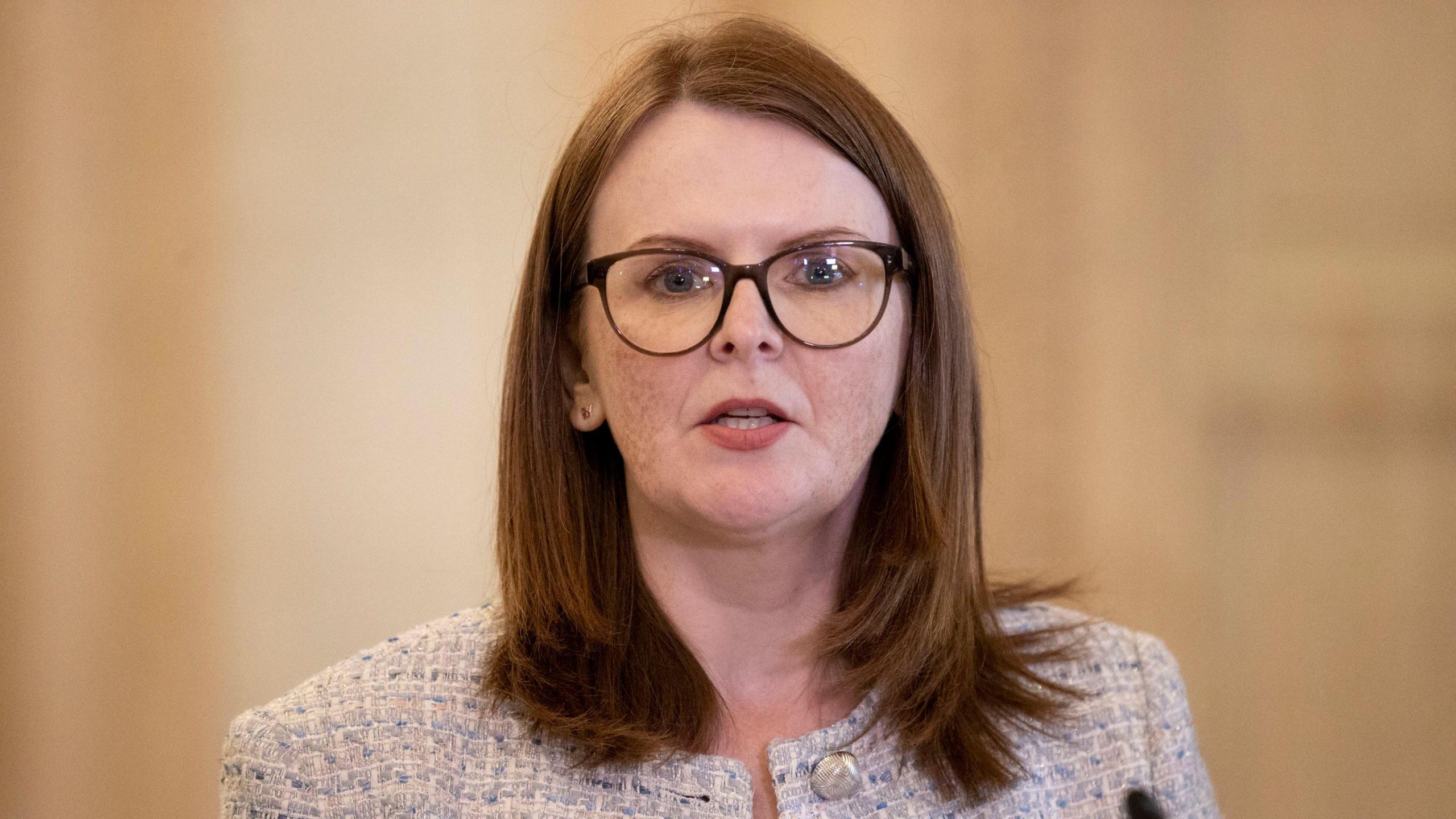Six months since Stormont returned, how is it going?
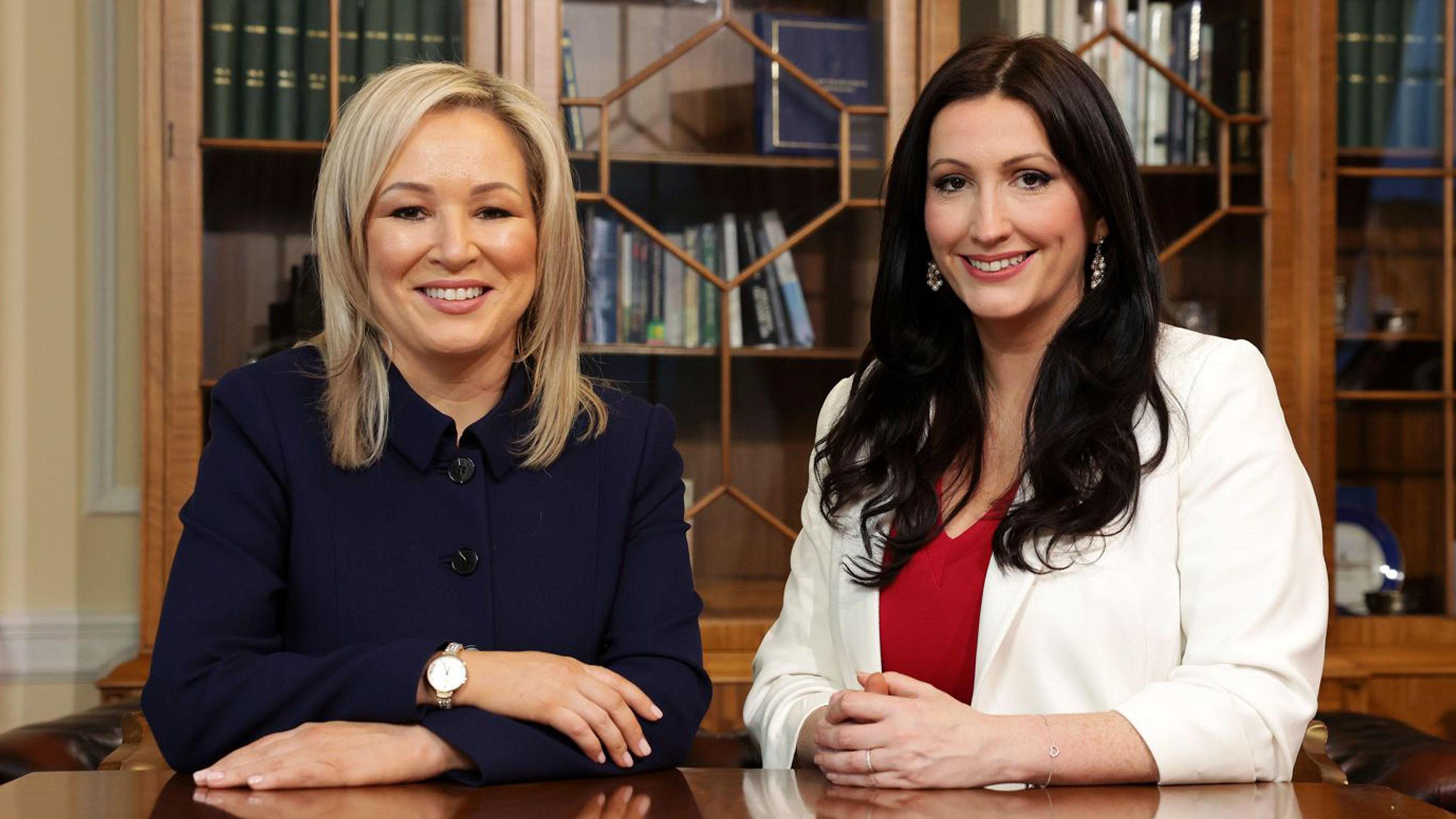
Michelle O'Neill and Emma Little-Pengelly following the restoration of the Northern Ireland Executive in February
- Published
Northern Ireland is far from a byword for stable government.
But unlikely as it sounds, it currently has the longest serving government leaders across Ireland and Great Britain.
It has been six months since Stormont's devolved government was restored following a two-year hiatus.
Since then much has changed politically across these isles, with a new prime minister, new taoiseach (Irish PM) and new first ministers in Scotland and Wales.
Six months in, how is the Northern Ireland Executive faring?
Remaining intact so far will, for some, be regarded as a success in itself.
But others say its return has yet to be properly tested, with many key decisions still outstanding.
A significant omission is the Programme for Government, in which the executive is supposed to set out its priorities for the years ahead.
While Labour outlined its plans in the King’s Speech within a fortnight of winning the UK general election, a similar policy blueprint for Northern Ireland remains elusive.
It is a "big shortcoming in these first six months", according to Ann Watt, director of the Northern Ireland think tank Pivotal.
"As a result, it's not clear what the executive's priorities are or how we can expect public services to improve," she said.
Unlike Labour with its landslide majority, the Stormont executive has the significant added challenge of being a four-party coalition.
'Positivity and purpose'
Ms Watt acknowledged there has been "positivity and purpose" around the return of the power-sharing institutions.
First Minister Michelle O'Neill, of Sinn Féin, and Deputy First Minister Emma Little-Pengelly, of the Democratic Unionist Party (DUP), have engaged in community outreach with a number of joint photocalls and engagements.
They attended a Northern Ireland women's soccer match at Windsor Park in south Belfast, and tried out the Gaelic Athletic Association (GAA) sport of camogie in the west of the city.
Ms Watt said they had "clearly made serious efforts to work together and present a united front".
"The executive appears to be working in a business-like and constructive way, which has not always been the case in the past," she added.
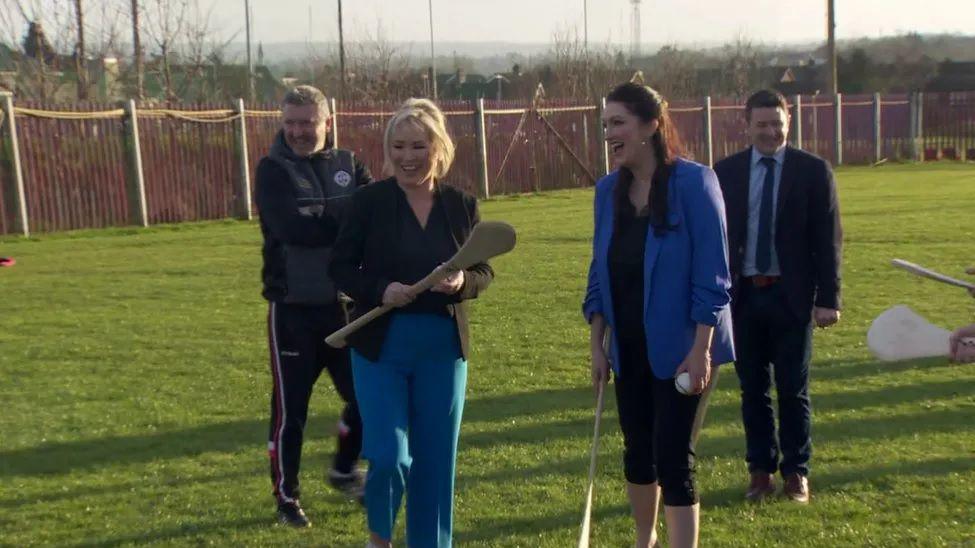
Michelle O'Neill and Emma Little-Pengelly at St Paul's GAC (Gaelic Athletic Club) in west Belfast
But Esmond Birnie, a senior economist at Ulster University, said judging success simply on pragmatic relationships would "set the bar too low".
He said the executive agreeing a budget was "an achievement of sorts", although one minister voted against it.
"Collective responsibility is still absent in the executive," he added.
Dr Birnie said some "rather important and necessary" considerations remain unresolved, such as the "conditions" attached to a £3.3bn UK government funding package for the restored executive.
"The UK government is looking for substantial revenue-raising efforts by the executive - a figure of £113m. So far there is little indication of what the executive intends to do," he added.
Ruled out domestic water charges
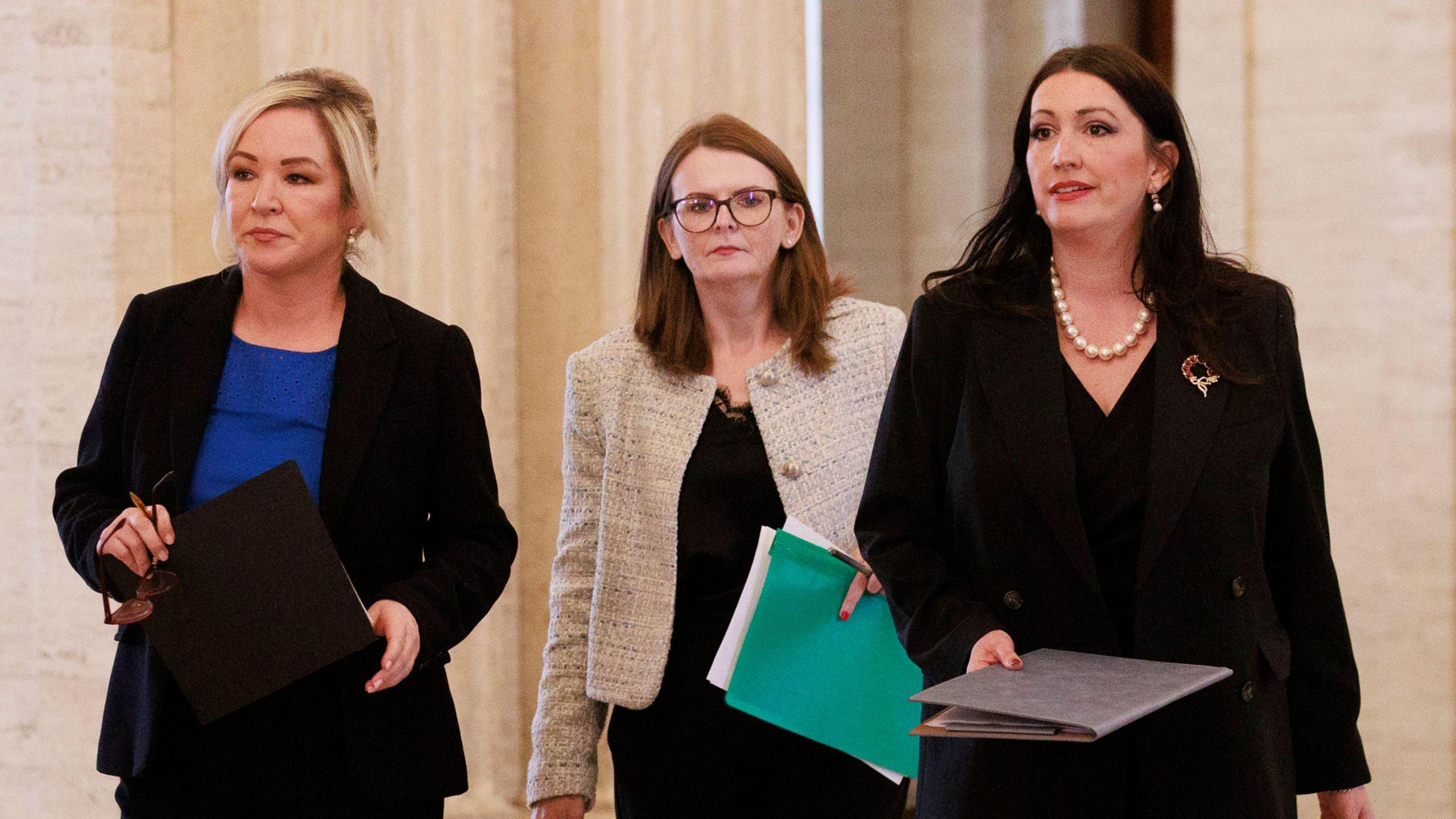
Michelle O'Neill, Caoimhe Archibald and Emma Little-Pengelly
The economist pointed to how ministers have ruled out domestic water charges and there has been "no sign" of early reforms to the rates system - a tax based on property values.
"The UK government requires the executive to publish - and then implement - a plan as to how it will 'stabilise' its finances over the medium term. Where is that plan?"
Finance Minister Caoimhe Archibald has managed to negotiate with the UK Treasury an interim fiscal deal to enhance funding arrangements for Stormont.
But with Labour warning of a £22bn "hole" in the UK's public finances, Ms Watt said "it's not realistic to expect big new injections of government funding".
"This will involve difficult and perhaps unpopular decisions," she said.
Andrew McCormick, a former senior Stormont civil servant, said the executive was, so far, "not remotely gripping the really difficult issues".
He in particular highlighted the problems in Northern Ireland's health service, which has the worst waiting lists in the UK.
Dr McCormick questioned how the political discourse has instead tended to focus on issues such as redeveloping Casement Park GAA stadium.
He said the issues in healthcare would not be resolved overnight, but "if we’re not talking about them" he warned that "you're just perpetuating failure".
He said they must "get right down to the heart of the issues in a serious way."
'Photo ops over substance'
Matthew O'Toole, leader of the opposition in Northern Ireland's legislative assembly, argued the executive's first six months have prioritised "photo opportunities over substance".
The Social Democratic and Labour Party (SDLP) assembly member said executive parties have "passed dozens of motions on every conceivable subject", but have "failed to publish a Programme for Government with clear targets".
To deliver those targets, Stormont's executive and assembly must remain standing - far from a guarantee based on past experience.
In the 26 years since the 1998 Good Friday Agreement peace deal which formed the institutions, they have been suspended for about 10 of them.
The most recent two-year collapse resulted from the DUP walking away in a row over post-Brexit trade arrangements.
It eventually returned to the institutions after a deal with the UK government brokered by the DUP's then leader Sir Jeffrey Donaldson.
His shock departure in March after he was charged with historical sex offences, which he is contesting, was another precarious moment for Stormont.
Since then Gavin Robinson has been installed as DUP leader and the devolved government has continued.
A sustained period of stable government is what Northern Ireland needs most, according to Ms Watt.
"It has been good to see positivity and constructive working from the executive in the last six months, but we need it to be robust enough to withstand difficult political periods too," she added.
However, Mr O'Toole said that "meaningful reform and a plan to rescue our public services are the bare minimum the public can expect".
"Stormont needs to do more than simply be there."
What does the executive say?
The Executive Office said "significant progress has been made on key issues", including the resolution of public sector pay disputes.
It also cited £25m being allocated for childcare and early learning support, capital investment for schools to help children with special needs, and initial payments for historical institutional abuse victims.
A spokesman said work is continuing on a Programme for Government and "ministers continue to engage with the Treasury to ensure we have adequate and sustainable public finances".
"The executive will work tirelessly to bring about that fiscal stability, to ensure our public services are properly funded," he added.
- Published30 July 2024
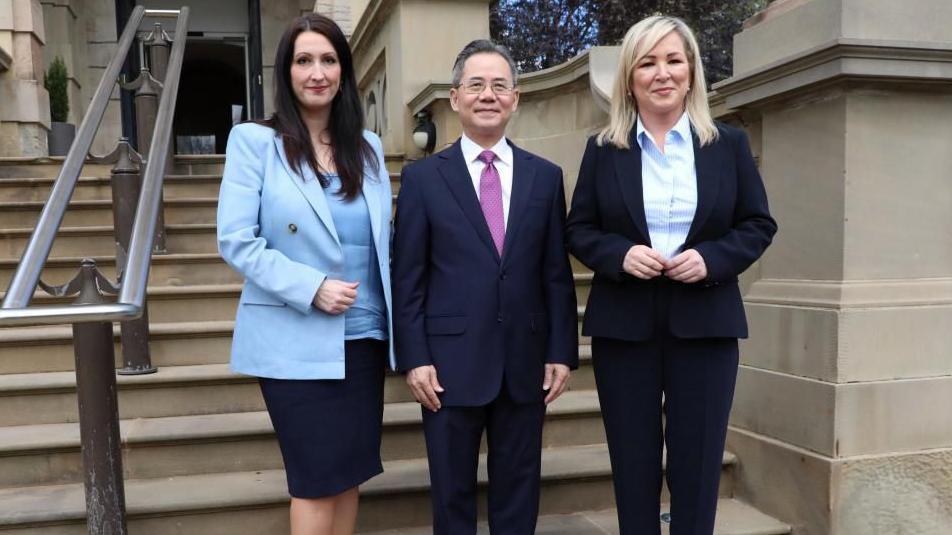
- Published29 July 2024
